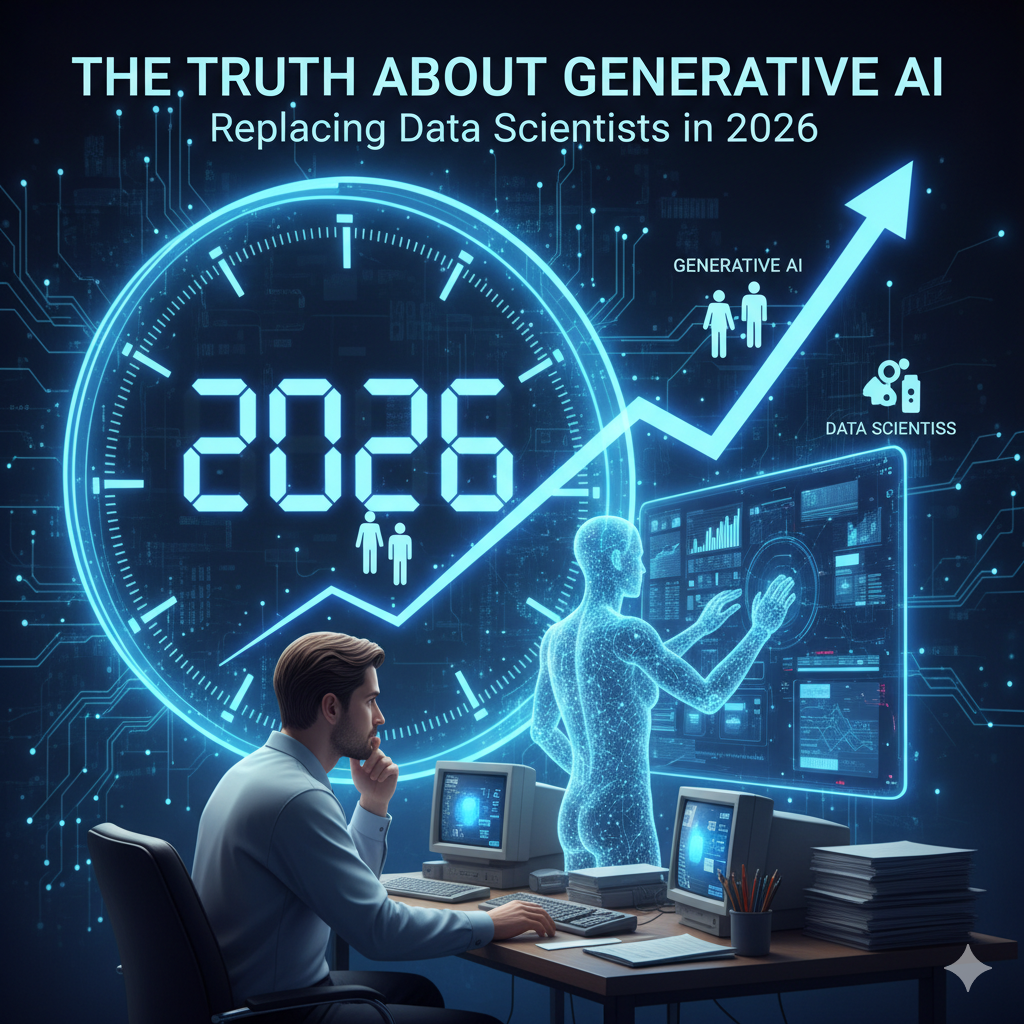As 2026 unfolds, one of the most heated debates in the tech world continues: Will Generative AI replace data scientists? The rise of tools like ChatGPT, Claude, and Gemini has sparked both excitement and fear — excitement over automation and innovation, and fear that AI could render human data experts obsolete. But the truth, as always, lies somewhere in between.
Read More: The Truth About Generative AI Replacing Data Scientists in 2026
The Hype: Gen AI as the “Ultimate Data Scientist”
Generative AI (Gen AI) has made incredible strides. From automatically writing SQL queries to generating machine learning code, summarizing datasets, and visualizing trends, AI systems are now capable of performing tasks that once required advanced technical skills.
In 2025 alone, over 40% of organizations adopted Gen AI assistants to support data analytics workflows. Many companies now use AI copilots to help junior analysts clean data, generate Python code, and even suggest model architectures.
So yes — Gen AI can do a lot. But can it replace the human data scientist?
The Reality: Automation ≠ Replacement
Despite the hype, data science is far more than code and algorithms. It involves critical thinking, business context, and ethical judgment — areas where Gen AI still struggles.
Here’s why data scientists remain irreplaceable in 2026:
-
Understanding the “Why,” not just the “What”
Generative AI can produce outputs, but it doesn’t inherently understand the problem context. Data scientists connect the dots between data insights and business objectives — something AI can’t yet replicate. -
Data quality and bias management
AI models rely on the data they’re fed. Human experts are still essential for detecting data leakage, cleaning irregular datasets, and identifying subtle biases that AI often overlooks. -
Ethics and governance
With increasing regulations around AI transparency and data privacy, data scientists play a crucial role in ensuring compliance, interpretability, and ethical AI deployment. -
Cross-functional collaboration
Data scientists communicate with product managers, engineers, and executives to shape data-driven strategies. AI can generate insights, but it can’t navigate organizational politics or stakeholder needs.
Understanding Generative AI in Data Science
Generative AI includes models that create new content based on learned patterns.
In data science, these models can help with tasks like adding data, suggesting model designs, and drafting early analyses. They are useful for speeding up repetitive work and helping teams test ideas faster.
However, these systems lack human intuition and do not understand business context on their own. They cannot replace the expertise needed to ask the right questions or interpret results.
While generative AI can speed up experiments, choosing which ones to run and why remains a human responsibility.
The Common Myths Around AI Replacing Data Scientists
Myth 1: AI can do all data analysis on its own.
Reality: Generative systems need direction. They can produce outputs, but they require human guidance to define objectives, choose datasets, and validate findings.
Myth 2: Data scientists will become obsolete.
Reality: Roles are evolving. Instead of disappearing, many data professionals are taking on roles as AI supervisors, prompt engineers, and cross-functional strategists.
Myth 3: Businesses will save money by cutting human roles.
Reality: Organizations that adopt AI often invest more in skilled talent to maintain and govern these systems.
Myth 4: AI understands business goals.
Reality: AI lacks contextual understanding and ethical judgment. Translating business strategy into actionable data work remains a human skill.
The Shift: From Data Scientists to “AI-Driven Problem Solvers”
What’s actually happening isn’t replacement — it’s evolution.
In 2026, data scientists are leveraging Gen AI as a collaborator rather than a competitor. AI now automates repetitive tasks like feature engineering, report generation, and model testing, freeing humans to focus on creativity and strategy.
New hybrid roles are emerging, such as:
-
AI-Augmented Data Scientist – focuses on integrating Gen AI tools into data pipelines.
-
Prompt Engineer for Analytics – specializes in guiding AI models to produce reliable analytical outputs.
-
AI Governance Specialist – ensures responsible AI usage and compliance with new regulations.
The future belongs to professionals who embrace AI as an ally, not those who resist it.
Preparing for the Future
If you’re a data scientist or aspiring to become one, here’s how to stay ahead:
-
Master AI tools – Learn how to use Gen AI platforms for data exploration, visualization, and model building.
-
Sharpen your soft skills – Communication, problem framing, and storytelling will become even more valuable.
-
Focus on domain expertise – Business context will differentiate humans from machines.
-
Understand AI ethics and governance – These areas will be central to data science roles in regulated industries.
Visit Here: https://www.fusion-institute.com/will-gen-ai-replace-data-scientists-myths-vs-reality
Final Thoughts
Generative AI isn’t here to replace data scientists — it’s here to amplify them.
By automating routine work, AI enables professionals to focus on what truly matters: driving insight, innovation, and impact. In 2026 and beyond, the most successful data scientists won’t compete with AI — they’ll collaborate with it.



